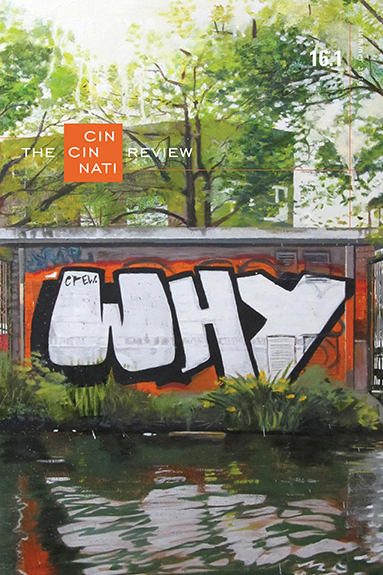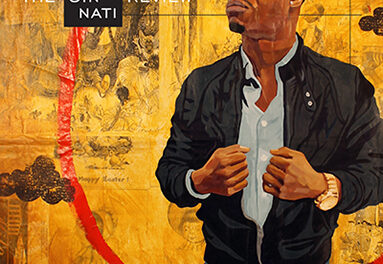My boyfriend had no interest in scaring me until I began working with the Devil Boy. After that, he—my boyfriend, not the Devil Boy—paid careful attention to me, planning and executing little jolts. Frightening me became a sort of art. He started small, with silly, generic gestures at first, anything that would elicit a reaction: a rubber roach inside the box of my favorite cereal, a lizard with red plastic eyes waiting as I stepped out of the shower, a relentless series of breathy voice mails from a blocked number. The pranks of a child. Later, of course, he progressed.
He was sweet and timid, this boyfriend of mine, having grown up with terrible asthma and an overbearing father, the combination of which had resulted in him missing months of school at a time, growing quiet and withdrawn, developing all the requisite habits of a future computer programmer. His shyness was one of the things that had drawn me to him. He had the auburn hair of a Red Setter, and the slow, doleful gaze of an old-fashioned fire-and-brimstone preacher. He told me of long hours spent as a boy in his sickbed listening to voices moving beneath him and the slow drumming of his own heart.
I found gummy worms burrowed deep in my container of yogurt: my boyfriend’s doing. I spooned them out and smiled. His efforts were a form of attention, a way of noticing what attracted or repelled me. I’ll admit: Whether I should have been or not, I was flattered. This electricity between us now, it seemed to mean that something was happening.
We did not talk about it, but I knew. My boyfriend knew I knew. It was one of those things that went without saying. Like the fact that calling him “my boyfriend” was ridiculous. At his age. At mine. I’d considered adopting “beau” or “gentleman-friend,” but this made me sound arch, like I was speaking ironically. I’ve always been a plainspoken woman of no-iron shirts and comfortable undergarments, so archness did not suit me. I’d tried using “partner,” but this made me sound stilted, like I’d joined a law firm of very meek and hesitant attorneys.
At night, he’d begun stroking my hair again, a thing I liked for him to do before I fell asleep. He hadn’t done this in ages, so it felt as if I had earned something. We’d grown more affectionate with one another, more demonstrative.
“You know I’ll always take care of you,” he said when we fell silent. “You don’t have to work with those kids. Juvenile delinquents.”
“I have to,” I said. “You know I have to.”
I had to because it was my job. But what I also meant was that I wanted to—I wanted to see all those children, most especially the Devil Boy. I could not stop thinking about him. The Devil Boy followed me in my thoughts after I’d left the clinic, haunting me like something I’d birthed and abandoned. This haunting left me harrowed, wrung out, compliant.
“You don’t have to,” my boyfriend responded. He went quiet, his hand frozen just above the pulse in my throat, curled like a snake watching its prey. Our breathing slowed, and we lapsed into the hush of two people drifting toward sleep. Then he hugged me ferociously, with such suddenness I startled.
He laughed and kissed me.
“I’ll take care of you,” he said, kissing me again, firmly, stealing my breath away.
The clinic where I worked was on the other side of Bolton Hill, walking distance from our apartment. In good weather, I did walk, crossing the bridge and passing the train station, where grimy artists bicycled one direction, DC-bound commuters in suits marched briskly in the other. I picked my way over the uneven sidewalks, where the houses were shaded and beautiful, although often in need of renovation. I’d once dreamed of being the kind of person who owned one of those houses, working throughout the weekdays in order to devote myself on the weekends to the loving repair of my Victorian home. Families lived in Bolton Hill, and I thought of them as families of style and intellect, families unafraid of a little petty theft or of the late-night shenanigans of the nearby art students. I had given up on the idea of forming such a family myself. My boyfriend and I had met one another later in life, and he did not want children. In truth, neither of us had proven very good at taking on long-term projects.
At the far side of the neighborhood, in an area that became plain old West Baltimore, was the clinic where I worked. It was a new site. Our office sat in a repurposed storefront, sad and slumping, with blacked-out front windows for privacy. A falsely cheerful sign with jaunty stick figures promised child and family services. The people who came to see us, our clients, were there under duress—referred, often, by a concerned school guidance counselor or the court system.
My supervisor was a cheerful woman in her sixties named Tawny. Tawny had short, chic steel-gray hair and wore brightly patterned scarves. She had the air of someone who would be good in any number of hypothetical crises, able to staunch wounds or oversee a precipitous labor in the back seat of a taxi. She was warm and practical and fast-talking. She did not attempt to disarm reluctant clients but rather wore them down with her relentless competence.
“There’s no magic to this,” she’d tell me. “Our clients need bus tokens. Our clients need canned soup. Our clients need structure.”
A lot of what Tawny did was reinforce positive parenting strategies. No one questioned her advice because she spoke with a hard-won authority. When I offered input, on the other hand, people looked skeptical.
“Have you ever raised a child?” one woman had scoffed, although her question was not actually in quest of any answer. “You don’t know the first thing.”
She grabbed her little boy by the arm then, jerking him roughly from the bookshelf he’d been trying to climb. He yelped, his eyes seeking mine, waiting for me to reprimand his mother, perhaps—to assert myself as the one true adult authority in the room. I felt chastened under his child’s gaze, the brutal wisdom of it. I said nothing.
Tawny was quick to emphasize, however, that we had authority. We had knowledge, credentials—just look at the certificates on our wall! Having a baby did not automatically imbue one with parenting skills! Not having had a baby did not diminish one’s professional acumen! She’d speak in this vein from time to time, and I knew she was doing it for my own benefit, to bolster me. Tawny herself had raised two children, neither of whom had landed in jail yet, she was quick to add with a laugh.
“They say we’re getting a tough one,” she told me one fine Friday in autumn. It was warm outside still, but with an edge of the cool weather to come, sunlight filtering golden through the ruddy leaves. Even the grimy parts of the city seemed beautiful. Someone had finally addressed the thriving mischief of rats that had threatened to overtake the alley by our building, catching and hauling away the most vicious. A few mean, fat holdouts still grappled in our dumpster over empty bottles of grape Fanta and the fiery crumbs at the bottom of spent Takis bags, so we were careful to avoid taking our clients out the side door.
I smiled at Tawny and nodded. Fall was my favorite season. My boyfriend and I would sit outside under an umbrella at our favorite café, each reading a book while we ate sandwiches in pleasant, almost telepathic communion. I looked forward to this. I’ve never minded the smallness of my pleasures.
“James Hadley,” Tawny said, and I noticed this time that there was a slight twitch in her eyelid, which meant she was tired, or had had too much coffee, or both. What she would not be was nervous. Tawny was unflappable. She had been bitten by boys just out of juvenile detention, had been punched in the face once by a three-hundred-pound pregnant sixteen-year-old, bore the claw marks of shrieking twelve-year-old girls. After such instances, she’d merely looked at me, unfazed, and asked for an ice pack. The most troubled of troubled children, the wounded, the feral—she’d look them all right in the eye without wavering.
“History of violence?”
She shook her head.
“Not officially.” She was frowning, flipping through some of her paper work. “But one of the homes he lived in burned down. Suspected arson. Eventually, one of the other boys confessed he did it by accident. With another family, one of his foster sisters kept showing up to school with unexplained bruises. No placement has kept him longer than a couple months.”
“Psych history?” I asked.
She shook her head again. “He’s been evaluated. Didn’t meet criteria for ADHD. Oppositional defiant, but isn’t that all of them these days?” Tawny shrugged, handing me the boy’s intake file to skim.
When James arrived a little later, he appeared undernourished, swallowed by a large blue jacket. He did not look up at us. His foster mother had a harried look, a flightiness to her gestures that suggested she was overdue for a cigarette. I watched Tawny exhale when she saw the boy, surely having imagined someone larger and more imposing. These days there are eleven-year-olds with the heft of full-grown men.
Tawny and James were in the conference room for a long time. I sat at the desk outside gazing into our small lobby, the blue plastic chairs that looked like they belonged in a school cafeteria, fine shafts of dust suspended like glitter in the sun that filtered through the blinds. Usually, I could expect raised voices, a child yelling at his or her parent, the parent’s voice rising in frustration, and then Tawny, cool and practical, soothing everyone back down. Today, I heard nothing.
At a certain point, the foster mother walked out of the conference room, shutting the door gently behind her as one would if whoever was inside had fallen asleep. She proceeded, tiptoeing almost, to the waiting room, where she seated herself in one of our too-small chairs, clutching her bag in her lap like a shield. I watched as she closed her eyes, breathing—resting, I thought at first. Only then I saw she was softly crying.
It seemed a long time later that Tawny and the boy finally exited the meeting room. The foster mother thanked Tawny quietly, and she and the boy were gone.
Tawny turned to me. Something unintelligible passed across her face. She gazed at me steadily, impassive.
“How was he?”
She exhaled slowly and did not answer at first.
“Fine,” she said. “Perfectly polite.” She rubbed her temples with both hands. “I’m just getting one of my headaches.”
“Sit down,” I told her. “Let me get you some tea.”
She obeyed me, suddenly childlike herself, docile. I handed her a cup, and she closed her eyes and drank.
. . .










